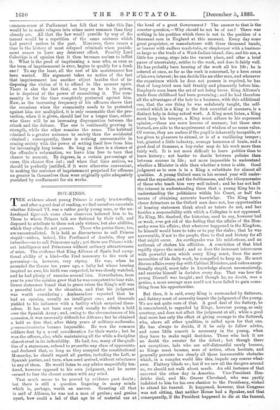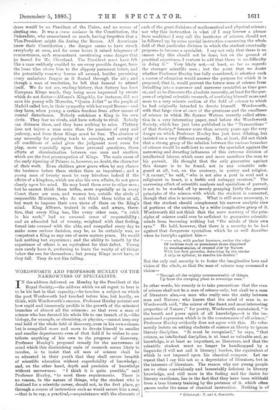BOY-KINGS.
THE evidence about young Princes is rarely trustworthy, and after a good deal of reading, we find ourselves uncertain whether Edward VI. was a rather goody young man, or the un- developed tiger-cab some close observers believed him to be. Those to whom Princes talk are flattered by their talk, and disposed to attribute to them not only virtues, but also abilities, which they often do not possess. Those who praise them, too, are uncontradicted. It is held as discourteous to call Princes stupid—unless, indeed, like Ferdinand of Austria, they are imbeciles—as to call Princesses ugly; yet there are Princes with- out intelligence and Princesses without ordinary attractiveness of mien. The evidence that King Alfonso of Spain had excep- tional ability of a kind—the kind necessary to the work of governing—is, however, very strong. He was, when he ascended the throne ten years ago, a lathy lad whose bearing inspired no awe, his birth was suspected, he was closely watched, and he had plenty of enemies around him. Nevertheless, from year to year the opinion grew that he was competent to bear rule. Grave statesmen found that in grave crises the King's will was a powerful factor in the situation, and that his judgment was worth considering ; Ambassadors reported that he had an opinion, usually an intelligent one ; and Generals yielded to his influence with a facility which surprised them- selves. It has not been easy work usually to obtain a hold over the Spanish Army ; and, owing to the circumstances of his accession, it was unusually difficult for Alfonso ; but he obtained a hold so firm that, after thirty years of military.outbreaks, prowinaciantientos became impossible. He won the common soldiers first by a novel consideration for their wants ; but he won the officers, also, while maintaining all the while a discipline almost cruel in its inflexibility. He had, too, many of the quali- ties of a statesman, refused to proscribe any class of opponents, and declared that, so long as they accepted the constitutional Monarchy, he should regard all parties, including the Left, as Spanish parties, and turn, when need arrived, without reluctance to any of them. He would listen to any advice respectfully ten- dered, however opposed to his own judgment, and he never seemed to fear the closest contact with any mind.
That much seems to be proved by evidence past doubt ; but there is still a question lingering in many minds
which is, perhaps, worth an answer. Granting all that is said of Alfonso, he was not a man of genius ; and genius apart, how could a lad of that age be of material use at the head of a great Government? The answer to that is the counter-question,—Why should he not be of use ? There was nothing in his position which there is not in the position of a thousand men in England at this moment. Every day some great proprietor, or manufacturer with three thousand hands, or brewer with endless mash-tubs, or shopkeeper with a business as large as the trade of a West-Indian island, dies, and his son, a little too young, steps into the vacant place, and after a brief pause of uncertainty, settles to the work, and does it fairly well. He has probably been hearing of the work all his life ; he is sobered at once, as far as the work is concerned, by a keen sense of his own interest; he can decide like an older man, and whenever the experience which he does not possess is required, he has that of long-tried men laid frankly and pleasantly before him. Employs soon learn the art of not being bores. King Alfonso's trade from childhood had been governing; and he had therefore all the advantages of the heir to a business, with this additional one, that the one thing he was sedulously taught, the self- control which in a King is the first essential of manners, is a distinct help in doing actual work. A King must listen, a King must keep his temper, a King must adhere to his expressed opinion,—those are mere lessons of manner; but those once learned, are aids to the acquirement of wisdom of no mean value. Of course, they are useless if the pupil is inherently incapable, or too given to pleasure to attend, or is of a vacillating temper ; but, granted a little industry, average keenness of brain, and a good deal of firmness, a boy-ruler may do his work more than fairly well. It is not more difficult to learn politics than to learn history ; not harder to decide between policies than between courses in life ; not more impossible to understand whether a Minister is able than whether a tutor is able. Good judgment as to men is in a King a substitute for almost all qualities. A young Oxford man. in his second year will under- stand the capacities, anti the feeblenesses, and the idiosyncrasies of those who teach him very well indeed ; and he has not half the interest in understanding them that a young King has in understanding the politicians within his Court, or half the means of obtaining accurate knowledge. The King hears clever detractors as the Oxford man does not, has opportunities of hearing statesmen think aloud as tutors do not, and has besides a responsibility with which a Collegian is not oppressed. No King, Mr. Sanford, the historian, used to say, however bad or weak, ever got rid of the feeling that the affairs of the Mon- archy were his affairs ; that whatever happened in the Kingdom, he himself would have to take or to pay the stake ; that he was answerable, if not to the people, then to God and history for all that might occur. An earthquake was his misfortune, and an outbreak of cholera his affliction. A conviction of that kind rapidly ripens the mind ; and so does the incessant intercourse with powerful men which every King must, from the mere necessities of his daily work, be compelled to keep up. He must discuss affairs every day with Cabinet Ministers, and unless-excep- tionally stupid, must take in knowledge almost unconsciously, and exercise himself in decision every day. That was how the young Disraeli was taught ; and though he, no doubt, was a genius, a more average man could not have failed to gain some- thing from his opportunities.
But then, it is said, every King is surrounded by flatterers, and flattery must of necessity impair the judgment of the young. We are not quite sure of that. A good deal of the flattery, be it remembered, is regarded by Kings, however young, as only courtesy, and does not affect the judgment at all ; while a good deal more has only the effect of giving courage to the flattered, who, above all other qualities, is called upon for that one. He has always to decide, if it be only to follow advice, and some little conceit is necessary in the young, when they have to make rapid decisions. Those who lack it are no doubt the sweeter for the defect ; but though there are exceptions, lads who are self-distrustful rarely become, as Kings must become, men of action, often hesitate, and generally perceive too clearly all those innumerable obstacles which, in a complex world like this, impede any course what- ever. Flattery blinds us ; but if we saw all the dangers around us, we should not walk about much. An odd instance of that occurred the other day in America. Vice-President Hen- dricks died, and Mr. Grover Cleveland, who was partly indebted to him for his own election to the Presidency, wished. to attend his funeral. It happened, however, that Congress was not sitting, that neither House had a Speaker, and that consequently, if the President happened to die at the funeral,
there would be no President of the Union, and no means of electing one. It was a cosu.s ontissus in the Constitution, the Federalists, who remembered so much, having forgotten that a VicePresident might die daring the Recess. All Americans know their Constitution ; the danger seems to have struck everybody at once, and for some hours it rained telegrams of remonstrance, each remonstrant meetioning some danger that he feared for Mr. Cleveland. The President must have felt like a man suddenly enabled to see every possible danger, from the loose tiles above him to the slippery pavement below, and the potentially runaway horses all around, besides perceiving every malarions fungus as it floated through the air ; and though a man of resolution, he left that funeral to attend itself. We do not see, readingshistory, that flattery has hurt European Kings much, they being more impressed by events which do not flatter—Alfonso's Kingship, for instance, did not save his young wife Mercedes, "Queen Juliet" as the people of Madrid called her, in their sympathy with her royal Romeo—and they-have, when young, a certain freedom from other causes of mental disturbance. Nobody outshines a King in his own circle. They fear no rivals, and have nobody to rival. Nobody can distance them, and they have nothing to seize. Flattery does not injure a man more than the passions of envy and jealousy, and from these Kings must be free. The absence of any necessity for pushing tends to serenity, and serenity of all conditions of mind gives the judgment most room for play, more especially upon those personal questions, those efforts at discrimination between one man and another, which are the first preoccupation of Kings. The main cause of the early ripening of Princes is, however, no doubt, the character of their work. Even children grow grave when by any chance the business before them strikes them as important ; and a young man of twenty must be very frivolous indeed if the affairs of a kingdom, which are also his own affairs, do not press closely upon his mind. He may hand them over to other men ; but he cannot think them trifles, more especially as in every Court there are men, and women too, outside the circle of responsible Ministers, who do not think them trifles at all, but want to impress their own views of them on the King's mind. King Alfonso, trained in exile, and aware, there- fore, that every King has, like every other man, "a crick in his neck," had an unusual sense of responsibility ; and an educated lad, of twenty, weighted with that feeling, foreed into counsel with the able, and compelled every day to make some serious decision, may be, as he certainly was, as competent a King as any one of more mature years. He would lack nothing but experience; and the ability to benefit by the experience of others is an equivalent for that defect. Young men rarely have it, preferring to learn the vanity of all things below /he sun for ; but young Kings must have, or they fall. They do not like falling.







































 Previous page
Previous page